‘Your dreams are left in the desert’: The faces and stories behind the end of Title 42
In the most recent turn of events in the migratory crisis, the lifting of the controversial norm — decreed during the Trump administration — has filled the cities of Ciudad Juárez and El Paso with thousands of people. They have terrible tales to tell. Here are a few of them
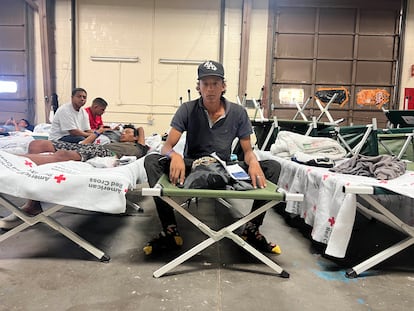
This past week, the streets of El Paso and Ciudad Juárez — two cities linked by the border that separates the United States and Mexico — were filled with terrible stories, by narrators in search of happy endings.
The lifting of Title 42 — a controversial immigration law imposed during the Trump administration — brought together thousands of people, anxious to jump to the other side of the border, or relieved to have reached the United States after months surviving a perilous journey filled with cold, fear, hunger, extortion and rape. The inhuman rigors of “The Beast” — the freight train on which most of them cross over from Mexico — and the ordeals of the hell that is the Darién jungle, a buffer shared by Panama and Venezuela, are hard to imagine. Most of the migrants who now populate the streets of El Paso hail from Venezuela, which is in the grips of a years-long humanitarian, economic and political crisis.
On Friday — the day after the end of Title 42 — the Mexican government announced that, due to a lack of resources, it had stopped issuing temporary transit permits, which had previously helped many migrants (who are now in the United States) to cross into the country. This measure — together with the tightening of asylum conditions imposed by Washington as of last Thursday — adds even more uncertainty for the tens of thousands of migrants who are halfway north.
In the immigration drama, migration figures have been at risk of losing their meaning for a long time. But behind the statistics, it’s important not to forget the faces and stories.
Luis David and Bernardo Enrique Marcano: “We spent 10 days with nothing, held up at the foot of the border wall.”
Last Wednesday — three months after leaving their home in Venezuela behind — the two brothers were sprawled in hammocks provided by the Red Cross at an El Paso migrant shelter. Luis David and Bernardo Enrique Marcano had arrived at dawn, after spending “10 days with nothing, held up at the foot of the border wall” that separates Mexico from the United States, at Gate 40.
The brothers had reached Ciudad Juárez and, once they crossed the Rio Grande, they entered the dusty no man’s land in the shadow of the border fence that is now U.S. territory. They took a long time because, says Luis David, “a woman lost her temper and spat on a sheriff. In retaliation, [the American authorities] decided to close the [point of] access for several days.”
They considered walking further east to Gate 42, but feared they would have a worse place in line: U.S. Border Patrol agents keep track of migrants who want to turn themselves in to authorities with a number, which they are given on a first-come, first-served basis. “There was no food there… we took turns going to look for something to eat on the other side of the river, afraid that, at any moment, they would open the door,” he recalls. The heat was unbearable during the days, while the cold of the desert night got into their bones. They didn’t have showers either, so there was no way to wash themselves properly for 10 days. Luis David says he’s looking forward to being able to spend a long time under the water before continuing the journey. He and his brother have been told that it will take them three days by bus to reach the place where their relatives are waiting for them.
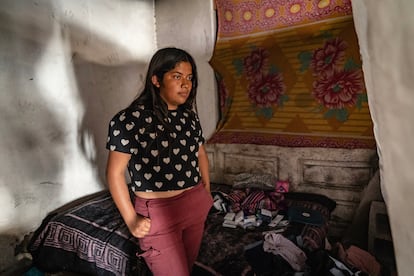
Paola Martínez: “Here, even your shadow betrays you”
She left Guadalajara, in the Mexican state of Jalisco, a little over six months ago, where she was harassed by “her family and economic problems.” She got on the fearsome La Bestia train — which crosses Mexico from south to north — at a corner of the capital known by migrants as “el basurero” (the garbage can).
“A very dangerous place,” explains Paola Martínez, 22, in Ciudad Juárez. “There, they rob you and rape the women.”
She tried to cross the border for the first time when she had been in Juárez for three months. “The cartel grabbed us and we couldn’t get through.” The criminals demanded money — money that she did not have — to lead her through one of the breaches in the border wall. Then, there would be four more attempts to get to the other side, where “the Border Patrol was always waiting.” Title 42 — which authorized quick expulsions that left no trace on file of those who tried to enter the U.S. — allowed her to try her luck again and again.
Her last attempt took place two weeks ago. She crossed through Gate 30. She was accompanied by a young man “who was messed up in the head” and from whom she heard nothing more after that night. Once again, she fell into the hands of the Border Patrol and was sent to a detention center. She remembers the apples, the water, the aluminum thermal sheets. “It was freezing cold in the room, worse than a freezer,” she recalls.
Martínez says that, for now, she will not try to cross again. Instead, she will try to put down roots in Juárez, the sixth-most-populous municipality in Mexico, with 1.5 million inhabitants, 70,000 of them foreigners. She has gotten a job in a bar, where she is paid 1,000 pesos a week ($56). With that salary, she’ll try to bring her three children. At this point, she only trusts them. “For me, a friend is a peso in my bag and a dog by my side. Here, even your shadow betrays you.”
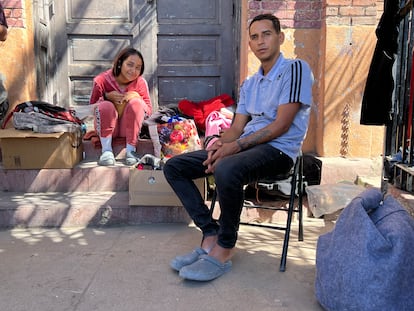
Exel Pérez: “If you fell asleep on The Beast, you were dead”
In Ciudad Bolívar, Venezuela, Exel Pérez was a police officer. He says that he wanted to catch “one of the most-wanted criminals,” and in response, the gangs threatened to “kill his family.” That was two months ago. On Wednesday, May 10, he was sitting in one of the few shady areas outside the Sacred Heart Church in El Paso, Texas, where he had slept outside for an entire week alongside his sister, his niece — Jailin, who is still smiling — and a cousin and his wife.
The five relatives crossed the fearsome Darién jungle on foot, one of the most dangerous journeys in the world, which has become a terrifying symbol of the latest migratory tragedy that begins in countries such as Venezuela and Colombia. Their problems began almost at once, when two heartless men stole their phones, money and food. Within a few hours, they learned that other victims had even less luck: they had been shot dead.
“I had sold my house, I had no more money,” Pérez explains. They moved through Panama into Costa Rica, then Nicaragua. In Mexico and Guatemala, they were robbed again… this time by the police. Then, they took La Bestia, the “death train.” Half-a-million migrants cling to its sides and its roof each year, heading to the United States. “That part was the worst,” Pérez recalls. “We got onto a half-open car. If you fell asleep, if you put your feet down, you were dead.”
He crossed the border “through a hole in the fence.” Once inside, he says that he tried to turn himself in “three times without success.” On Monday, May 8, they finally gave him the papers that certify that he is an asylum seeker. With these documents, he will be able to travel to New York, where a relative is waiting for him. He has an appointment with an immigration judge scheduled for 2025. He is only tied to El Paso for now because his cousin and his wife have still not shown up: they have not yet been released from the processing center. He fears that they may have been deported.
With the police increasingly impatient to empty the streets of El Paso — which have filled up with more than 2,000 people — he doesn’t know how long it’s reasonable to wait for them without getting arrested.
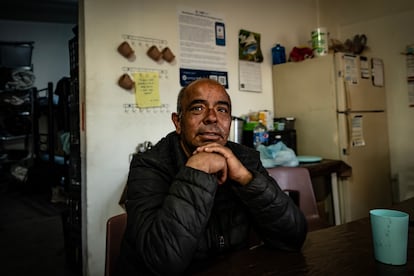
Jaime Rodríguez: “Your dreams are left in the desert”
Born in Mexico City, Jaime Rodríguez, 59, was trying to recover this week in a shelter in Puerto Palomas, in the state of Chihuahua, on the Mexican side of the border. His face shows burns that he received from the sun, after walking for four days through the semi-desert territory of New Mexico.
“It’s the hardest thing I’ve ever done in my life,” he sighs. “I had heard the stories about the roughness of the road, but I was not prepared for the walks in [90 degree] heat. You risk your life a lot… your dreams are left in the desert.”
Rodríguez has a blacksmith shop in Mexico City. He worked for rich people in the capital, but with the pandemic, his clients moved to their country houses, or to the beach. The business collapsed. He made the decision to leave: better him than his 18-year-old son who, he says, “is a good student.” He set New York as his target, where a brother-in-law lives.
But between him and fate stood the damned desert. The blisters prevented him from walking. He trailed behind until the guides left him behind. “They told me: ‘You can’t go on anymore, walk straight here for so many miles and there’s a drinking trough for the cows.’ They left…” The people-smuggler called his wife to tell her that I was going to stay behind “She started to cry,” he remembers.
In the hostel, he has been able to heal his feet with ointment and gauze. When he recovers, he will take a bus to Mexico City. He’s now starting to think about the $3,400 he needs to put together, so that he can pay the dangerous men who abandoned him to his fate.
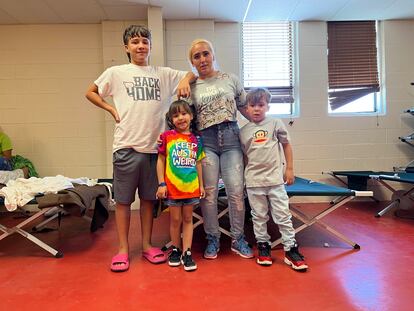
Meichel Hernández: “We have 15 days to reach Buffalo”
The trip — which took “about three months” — was made in the company of her husband, who does not want to be in the photo because, she says with a mischievous smile, he’s a “very famous singer” in Venezuela. They took their three children — Reinaldo, Antonella and Thiago, ages six, seven and 14 — and started walking.
“It was hell,” Meichel Hernández gasps. A hell that gave them no rest, even when they finally reached the United States. Antonella had to have an emergency operation upon arrival. “It was the cold; the water and the hunger that we suffered in the jungle, and then in La Bestia. A tooth got infected and it took over the entire right side of her face,” her mother laments.
They have been in the U.S. for just over two weeks. They turned themselves in “together with a lot of people” at Gate 40 of the wall that separates Ciudad Juárez and El Paso, where they found accommodation in a shelter. Immigration authorities — who have been showing more humane treatment to families with children — detained them in a processing center for a day. Later, they were released with a document, with which they can move freely throughout the United States.
The family has been given an appointment to meet with an immigration judge in Buffalo, New York, on May 26. They gave that address because they had a friend who told them he would help them… but he’s not there anymore. He lost his job and moved to Atlanta, Georgia. So now, they have to cover 1,800 miles in 15 days if they don’t want to miss their court date and risk deportation. Meichel is hopeful that, in Denver, Colorado, they will be able to obtain “humanitarian aid to be able to reach [the state of] New York.”
“We have 15 days to get to Buffalo… it’s the last adventure that destiny has given us.”

Sign up for our weekly newsletter to get more English-language news coverage from EL PAÍS USA Edition
Tu suscripción se está usando en otro dispositivo
¿Quieres añadir otro usuario a tu suscripción?
Si continúas leyendo en este dispositivo, no se podrá leer en el otro.
FlechaTu suscripción se está usando en otro dispositivo y solo puedes acceder a EL PAÍS desde un dispositivo a la vez.
Si quieres compartir tu cuenta, cambia tu suscripción a la modalidad Premium, así podrás añadir otro usuario. Cada uno accederá con su propia cuenta de email, lo que os permitirá personalizar vuestra experiencia en EL PAÍS.
¿Tienes una suscripción de empresa? Accede aquí para contratar más cuentas.
En el caso de no saber quién está usando tu cuenta, te recomendamos cambiar tu contraseña aquí.
Si decides continuar compartiendo tu cuenta, este mensaje se mostrará en tu dispositivo y en el de la otra persona que está usando tu cuenta de forma indefinida, afectando a tu experiencia de lectura. Puedes consultar aquí los términos y condiciones de la suscripción digital.








































